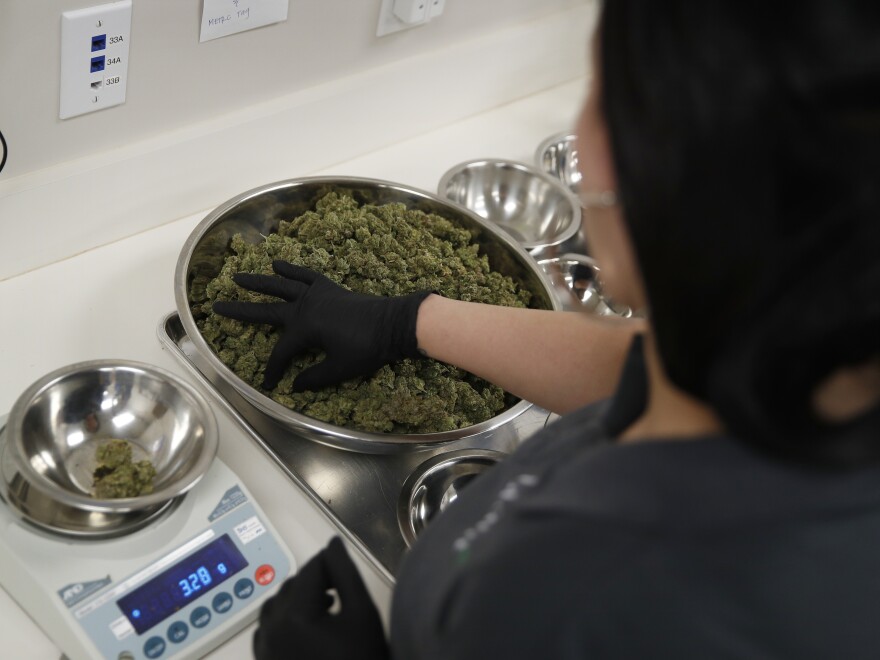An ounce of marijuana flower sells for $171 in Massachusetts, according to the Cannabis Control Commission. Two years ago, the price was $400 per ounce.
The legal marijuana industry in Massachusetts is showing signs of maturing.
In five years since the first recreational cannabis dispensary in the state opened in Northampton in 2018, gross sales of non-medical marijuana in Massachusetts hit $4 billion. In just the first five months of this year gross sales totaled $600 million.
But prices have plummeted. An ounce of marijuana flower sells for $171, according to the state’s Cannabis Control Commission. As recently as two years ago, the price was $400 an ounce.
Competition has grown, with hundreds of retail marijuana stores now open in Massachusetts. With the exception of New Hampshire, all the states that border Massachusetts now have legal marijuana businesses.
Last week, Trulieve, a Florida-based cannabis company, citing competitive pressures, announced it will exit the Massachusetts market. In a press release, the company stated it planned to close retail stores in Northampton, Worcester, and Framingham by the end of this month and shut down a large production facility in Holyoke by year’s end.
“I’ve been calling this the year of reckoning for the cannabis industry and I guess I was a little too correct on that,” said Aaron Vega, Director of Planning and Economic Development in Holyoke.
Almost immediately after voters in 2016 legalized recreational marijuana, Holyoke rolled out the red carpet to the industry, touting its hundreds of thousands of square feet of vacant mills and cheap electricity from hydro-power.
Trulieve, in 2019, invested a reported $30 million to purchase and renovate a 155-year-old mill building into a 126,000 square-foot cannabis growing and processing operation. Vega said Trulieve officials told him they plan to sell the facility.
“That to me feels like a pretty big ask because it is a very large facility and what we’ve seen recently is definitely more of the smaller craft-type cannabis companies coming to fruition,” Vega said.
In Springfield, the City Council is considering changing the marijuana zoning ordinance to allow retail cannabis stores to remain open until 11 p.m. – two hours later than the current required closing time.
Councilor Melvin Edwards, who chairs the Economic Development Committee, proposed the change after hearing from the operators of marijuana stores in the city who said later hours could help.
“Anything we can do that does not cause harm to the community, the neighbors, and the residents of our city, I feel we should try to do,” he said.
It does appear the Springfield marijuana retailers are at a competitive disadvantage with their currently allowed hours-of-operation, said Phil Dromey, Deputy Director of the Office of Planning and Economic Development.
“I was able to find there are a few communities around us that do allow hours to 11,” he said citing Holyoke and Northampton as examples.
Despite no one speaking in opposition to the proposed change at a recent hearing, the Council voted to continue deliberation to its June 26th scheduled meeting.
After a marijuana store closed in Northampton last December, the City Council there voted earlier this year to cap the number of available retail licenses in the city at 12. There will be one available when Trulieve closes its location.
The Holyoke facility Trulieve says it is going to try to sell is where a worker died last year after reportedly having an asthmatic attack triggered by inhaling cannabis dust. The company paid a $14,500 fine to the federal Occupational Safety and Health Administration. The case is still reportedly under investigation by state regulators.
In a required notification to the state, Trulieve said its decision to completely exit the Massachusetts marijuana market will result in 128 people losing their jobs.
H/T: www.wamc.com
You can view the whole article at this link Massachusetts legal marijuana industry faces a reckoning




 Breaking Through: Cannabis Science Hits a Turning Point
Breaking Through: Cannabis Science Hits a Turning Point Middletown Buzz: Cannabis Dispensary Proposal Pulls Out of Historic Downtown Project
Middletown Buzz: Cannabis Dispensary Proposal Pulls Out of Historic Downtown Project Norwalk Police Raid Smoke Shop, Seize Marijuana & Nitrous Oxide
Norwalk Police Raid Smoke Shop, Seize Marijuana & Nitrous Oxide Connecticut’s Cannabis Equity Council Relaunches $36M “Reimagine & Revitalize” Grant Program
Connecticut’s Cannabis Equity Council Relaunches $36M “Reimagine & Revitalize” Grant Program